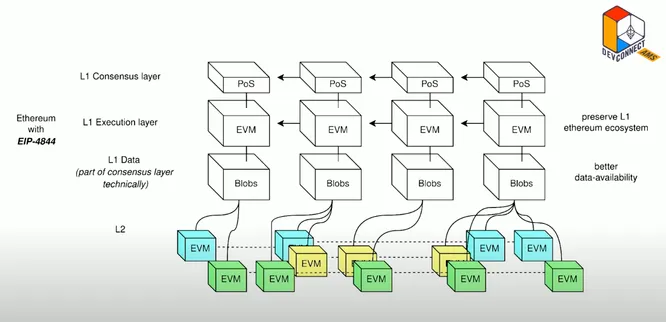The Shanghai upgrade provided significant benefits to Liquid Staking Derivatives (LSDs) and mitigated the uncertain duration risks for stakers. The forthcoming Cancun upgrade will introduce EIP-4844, a crucial enhancement designed to boost the scalability of L2 solutions.
L2 solutions like Arbitrum and Optimism have consistently struggled with high L1 data costs, which directly impact the profitability of their sequencers. Moreover, the fluctuating L1 data fees, driven by increasing demand for L1 blockspace, also have repercussions for end-users on L2s. As these costs escalate, they result in higher fees for L2 users. As shown above, L1 data costs account for a significant 60-90% of Arbitrum and Optimism’s revenue.

Source: https://www.youtube.com/watch?v=cEJDZguSYcY&ab_channel=EthereumDEVNL

Source: https://www.youtube.com/watch?v=cEJDZguSYcY&ab_channel=EthereumDEVNL
EIP-4844, also known as Proto-Danksharding, is set to introduce blob-carrying transactions. These transactions are akin to regular transactions but with the added feature of data known as a “blob” that can accommodate larger volumes of data. These blobs are committed to L1 for verification while their data is stored in a ‘sidecar’ within the consensus layer. This data is stored for roughly a month, providing ample time for honest actors to challenge the sequencer. After this period, the data is pruned, persisting only on Layer 2 (L2).
Moreover, the introduction of a multi-dimensional fee market will result in two resources with distinct gas prices and limits: gas and blobs. These resources will be priced independently on separate fee markets for data and execution. As a result, blob transactions will not compete with other transactions on L1.
The implementation of EIP-4844 will lower fees and boost the throughput of L2s. By reducing data fees, this upgrade can significantly enhance the profitability of sequencers, as the benefits are not solely directed toward end-users.
L2s implement minimum fees not only to curtail network spam but also to optimize for profits. For instance, Optimism has set a minimum fee of 0.001 Gwei, while Arbitrum has a higher threshold of 0.1 Gwei. With the upcoming Cancun upgrade, L2 sequencers can anticipate considerably higher profit margins as Layer 1 (L1) data costs are set to decrease substantially. This improvement will enable L2 sequencers to operate more efficiently and profitably.